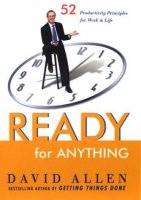 Ready for Anything: 52 Productivity Principles for Work and Life, by David Allen (Viking Penguin, 2003)
Ready for Anything: 52 Productivity Principles for Work and Life, by David Allen (Viking Penguin, 2003)
Having been so impressed by the ideas, if not the writing, of Allen's Getting Things Done, I was eager to read more. His latest book, Making It All Work, isn't yet available at our library, so I grabbed Ready for Anything.
As I began reading, I thought this would be a short review because there wasn't much new, that the book would be valuable as inspiration (very important!) but wouldn't add much to what I'm already working on. Now that I've finished, however, I know that this will be a short review because there is too much here, that there is much benefit I could reap by buying the book and taking time to work through the ideas and exercises. I'm not ready, as I'm still in the early stages of implementing the Getting Things Done ideas, but it will be a worthwhile later step.
Allen's New Age spiritual inclinations show more in Ready for Anything than in the previous book, but they're easy enough to ignore if you're alert to them, and don't detract significantly from his useful ideas. As with anything, take what's good and true and helpful, and leave the rest.
These quotes don't begin to cover Allen's ideas, but they're a taste. I have one more, but it merits its own post.
I just spent all morning pruning my large pine tree. It felt great… But it wasn’t on a list. This morning it just seemed like the thing to do.
If I didn’t have the lists I have, and if I hadn’t done a thorough review of them within the last few days, I wouldn’t have been able to trust that my inventory of “defined work” was complete and current this morning. And that it could wait. Without that conscious self-renegotiation process, there would be at least a slight gnawing sense of anxiety that there were shoulds lurking in the shadows that could attack me at any moment! And what’s the best (temporary) relief and (false) protection from the unseen and ugly shoulds? Get busy.
Without my lists, I would probably still have pruned my pine tree this morning—but for all the wrong reasons.
[I]t’s easy to create fancy systems in concept, software, and seminars, [but] how will they work when you have the flu and feel awful? Real systems must be solid enough to hold up in the toughest reality—when we least feel like maintaining them.
Rules tend to show up because principles are not clear or trusted. When you know that people have bought into standards, you can give them freedom for decisions and behaviors. If this alignment doesn’t exist, you must micromanage with regulations, expending much more energy in the long run.
I contend that a competitive edge, personal and organizational, is maintained by one’s ability to deal with surprise. It’s when the pressures of unexpected change challenge the systems and behaviors that excellence is really demonstrated.
Uh oh. I’m in deep trouble.
Your power is proportional to your ability to relax…. Find out what’s stressing you, and deal with it—now—if you want to be truly effective on all levels at once. Being relaxed and capable of focusing on what’s at hand, when it’s at hand, without over- or underreacting, is a master skill.
Ahem. New Year’s Resolution #3.
What do you not have time to do—something that might feel like a waste of time—but you know that it’s time to do? Walk in the garden? Have dinner with a friend? Take your team off site just to hang out together? Play laser guns with your kids? Walk away from the canvas, until you can’t help taking up the brush again?
Relax. You have to put in the clutch to shift gears. You have to let go to reengage at another, more high-leveraged ration. When you least feel like slowing down my be the most critical time to do it.
The Sabbath was made for man…. (Mark 2:27)
Small things, done consistently, create major impact. Real change occurs not with a flash in the pan but with steady engagement at some new level of interaction…. What’s tricky is that it takes an equally small amount of consistent negative behaviors to create significant unwanted consequences. Habitual self-degrading self-talk, though seemingly minor in the moment, reinforces lowered self-esteem and performance overall. Little stuff, unchecked, can create some of the worst problems.
Aim for success, not perfection. Never give up your right to be wrong, because then you will lose the ability to learn new things and move forward with your life. Remember that fear always lurks behind perfectionism. Confronting your fears and allowing yourself the right to be human can, paradoxically, make you a far happier and more productive person. – Dr. David M. Burns.
Excerpt: This passage from David Allen's Ready for Anything blew me away, and deserves its own post. We recently raised some prices—because I didn’t want business to go away. Let me explain. One day, I recognized a subtle internal dan...
Weblog: Lift Up Your Hearts!
Date: October 29, 2010, 7:11 am


